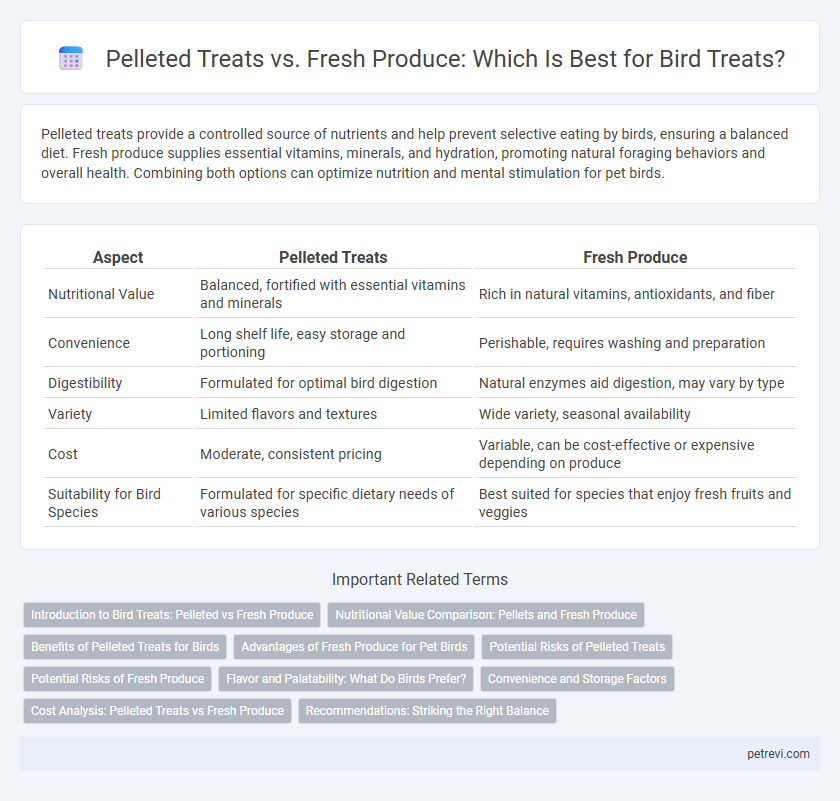Pelleted treats provide a controlled source of nutrients and help prevent selective eating by birds, ensuring a balanced diet. Fresh produce supplies essential vitamins, minerals, and hydration, promoting natural foraging behaviors and overall health. Combining both options can optimize nutrition and mental stimulation for pet birds.
Table of Comparison
| Aspect | Pelleted Treats | Fresh Produce |
|---|---|---|
| Nutritional Value | Balanced, fortified with essential vitamins and minerals | Rich in natural vitamins, antioxidants, and fiber |
| Convenience | Long shelf life, easy storage and portioning | Perishable, requires washing and preparation |
| Digestibility | Formulated for optimal bird digestion | Natural enzymes aid digestion, may vary by type |
| Variety | Limited flavors and textures | Wide variety, seasonal availability |
| Cost | Moderate, consistent pricing | Variable, can be cost-effective or expensive depending on produce |
| Suitability for Bird Species | Formulated for specific dietary needs of various species | Best suited for species that enjoy fresh fruits and veggies |
Introduction to Bird Treats: Pelleted vs Fresh Produce
Pelleted treats provide a controlled balance of essential nutrients and vitamins tailored for birds, ensuring consistent dietary intake. Fresh produce offers natural hydration and a variety of antioxidants, enzymes, and fiber important for digestion and overall health. Choosing between pelleted treats and fresh fruits or vegetables depends on the bird species' nutritional requirements and preferences.
Nutritional Value Comparison: Pellets and Fresh Produce
Pelleted treats for birds offer a balanced blend of essential vitamins, minerals, and proteins specifically formulated to meet avian dietary needs, ensuring consistent nutrient intake. Fresh produce provides a natural source of antioxidants, fiber, and hydration, supporting digestive health and immune function with varying nutrient profiles depending on the fruit or vegetable. Combining pelleted treats with fresh produce enhances overall nutrition by delivering both comprehensive vitamins and the benefits of fresh, bioavailable nutrients.
Benefits of Pelleted Treats for Birds
Pelleted treats for birds provide a balanced and consistent source of essential vitamins, minerals, and nutrients, ensuring optimal health and preventing dietary deficiencies. These treats are specially formulated to support feather quality, enhance immune function, and improve digestion. Unlike fresh produce, pelleted treats offer longer shelf life, reduced risk of contamination, and controlled portion sizes for better weight management.
Advantages of Fresh Produce for Pet Birds
Fresh produce offers essential vitamins, minerals, and antioxidants that promote optimal health and enhance the immune system in pet birds. Natural fibers found in fruits and vegetables support digestive health and encourage natural foraging behaviors, contributing to mental stimulation. Unlike pelleted treats, fresh produce typically contains low sugar and fat levels, reducing the risk of obesity and related health issues in birds.
Potential Risks of Pelleted Treats
Pelleted treats for birds may contain preservatives, artificial colors, and additives that pose health risks such as allergies or digestive issues. Over-reliance on pelleted treats can lead to nutritional imbalances, lacking essential vitamins and antioxidants found in fresh produce. Birds consuming excessive pelleted treats may also experience obesity and reduced natural foraging behaviors.
Potential Risks of Fresh Produce
Fresh produce used as bird treats can harbor harmful pesticides, bacteria, or mold that pose health risks to birds. Nutritional imbalances can arise from overfeeding certain fruits and vegetables, potentially leading to deficiencies or toxicities. Improper washing and storage of fresh produce increase the chance of contamination, making pelleted treats a safer, standardized alternative for avian diets.
Flavor and Palatability: What Do Birds Prefer?
Pelleted treats offer consistent flavor profiles engineered to appeal to a wide range of bird species, ensuring reliable palatability. Fresh produce provides natural, varied tastes and textures that many birds find more stimulating and enjoyable, enhancing their eating experience. Studies indicate birds often prefer the dynamic flavors of fresh fruits and vegetables but appreciate the convenience and nutrient balance found in pelleted options.
Convenience and Storage Factors
Pelleted treats offer superior convenience due to their long shelf life and compact storage requirements, making them ideal for quick feeding and minimal waste. Fresh produce provides essential vitamins and hydration but demands immediate consumption and refrigerated storage to prevent spoilage. Choosing pelleted treats simplifies storage logistics, while fresh produce supports a more natural diet but requires careful planning for optimal freshness.
Cost Analysis: Pelleted Treats vs Fresh Produce
Pelleted treats for birds generally offer a more cost-effective option compared to fresh produce, as they have a longer shelf life and reduce waste due to spoilage. Fresh produce, while providing essential vitamins and hydration, often incurs higher expenses because of frequent purchasing needs and perishability. Budget-conscious bird owners find pelleted treats more economical for regular feeding, though incorporating fresh produce supports dietary variety and nutrition.
Recommendations: Striking the Right Balance
Pelleted treats provide a controlled source of essential nutrients, ensuring birds receive a balanced diet without the risk of overfeeding sugars or fats often found in fresh produce. Fresh fruits and vegetables offer vital vitamins, antioxidants, and hydration, promoting natural foraging behavior and digestive health. Combining moderate amounts of pelleted treats with a variety of fresh produce optimizes nutritional benefits and supports overall bird wellness.
Pelleted Treats vs Fresh Produce for Bird Treats Infographic

 petrevi.com
petrevi.com